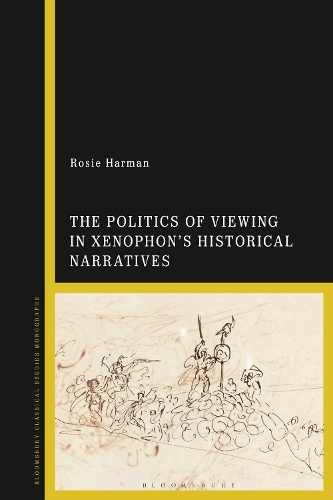
The Politics of Viewing in Xenophons Historical Narratives
(Hardback)
Available Formats
Publishing Details
The Politics of Viewing in Xenophons Historical Narratives
By (Author) Rosie Harman
Bloomsbury Publishing PLC
Bloomsbury Academic
9th February 2023
United Kingdom
Classifications
Tertiary Education
Non Fiction
Literary studies: ancient, classical and medieval
938.05092
Physical Properties
Hardback
240
Width 156mm, Height 234mm
Description
This book considers cultural identity and power relations in early fourth-century BCE Greece through a reading of Xenophons historical narratives, the Hellenica, Anabasis and Cyropaedia. These texts depict conflicts between Greek states, conflicts between Greeks and non-Greeks, and relations between the elite individual and society. In all three texts, politically significant moments are imagined in visual terms. We witness spectacles of Spartan military victory, vistas of Asian landscape or displays of Persian imperial pomp, and historical protagonists are presented as spectators viewing and responding to events. Through this visual form of narration, the reader is encouraged imaginatively to place themselves in the position of the historical protagonists. In viewing events from different perspectives, and therefore occupying multiple, often conflicting political positions, the reader not only experiences the problems faced by historical actors, but becomes engaged in the political conflicts acted out in the narratives. The reader is prompted to take pleasure in the sight of Panhellenic achievement, but also to witness the divisions and conflicts between Greeks on class and ethnic lines. Similarly the reader is invited to identify with spectacular Greek and non-Greek figures of power as emblems of Greek imperial potential, but also to see through the eyes of those communities subjugated at their hands. The depiction of spectacles and spectators draws the reader into an active participation in the ideological contradictions of their time, in a period when Panhellenic aspiration co-existed with hegemonic competition between Greek states, and when Greeks could be both beneficiaries and victims of imperialism.
Reviews
Rosie Harman offers a sparkling analysis of the ways in which the representation of visual experience in Xenophons historical works Hellenica, Anabasis and Cyropaedia invites readerly engagement with ideological problems facing the Greek elite of the early fourth century BCE. Addressing the politics of viewing in Xenophon against the backdrop of modern theory as well as ancient Greek cultural contexts of viewing and spectatorship, this sophisticated study shows how Xenophons texts prompt readers to occupy multiple, often conflicting political positions, and thereby experience for themselves the problems faced by historical actors. -- Emily Baragwanath, Associate Professor of Classics, The University of North Carolina at Chapel Hill
This book is a fine addition to the growing number of books on Xenophon. Its focus on the political implications of viewing, as construed in Hellenica, Anabasis, and Cyropaedia, rehabilitates Xenophon as a complex thinker and a cunning literary artist. -- Luuk Huitink, Assistant Professor of Ancient Greek, University of Amsterdam, The Netherlands
Author Bio
Rosie Harman is Lecturer in Greek Historiography at University College, London, UK.
